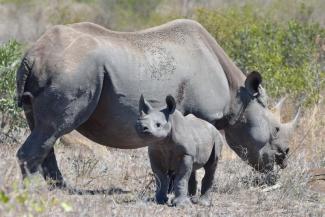Comment
Held hostage by rhinos
 Lissac/Lineair
Lissac/Lineair
South Africa plans to have 17 % of its territory protected by 2020. In 2012, the share was not quite seven percent. To expand protected areas and make protection more effective, the authorities must rethink conservation strategies.
The approach of community-based natural resource management (CBNRM) was developed in the 1980s. The idea was to make communities benefit from nature conservation, thus providing them with incentives to contribute to the cause. However, the experience has been mostly disappointing. So far, local communities have not benefited much, and they are certainly not enthusiastic supporters of nature protection.
In 2015, David Mabunda, then the chief executive of South Africa’s National Parks, spoke of “missing community ownership”. His conclusion was: “We have to change our focus towards sustainable living rather than conservation only”.
Indeed, local communities tend to feel they are held hostage by the rhinos they are supposed to protect. Poor and marginalised, some are likely to get involved in poaching and snaring. They struggle to survive, need to make money and nature parks are of little help in this regard.
It is true that among conservation activists and professionals there is a lot of talk of community involvement and ownership. Action must follow, however, and so far the ground reality of the people who live near nature parks has not really been taken into account.
Consider how you would feel if someone put an elephant or a rhino in front of your home. You probably would not like that. Now imagine that the animals feed on your fields, destroying the subsistence crop you and your family depend on. Would you merely chase the animals away, or wouldn’t you be tempted to kill them?
To improve the situation, the approach of conservationists and policymakers must change. Five things are essential:
- The local community must benefit in practice and not only in theory. Otherwise, the people whose involvement is essential for success will keep feeling exploited and abused as “research objects”. They will only consider nature conservation a burden.
- Cooperation with local communities requires acceptance of their traditional hierarchies and strong sense of family ties. It is necessary to listen to individuals and understand their stories. It does not help to discuss the “the community” in an abstract sense.
- Before making any plans for protected areas, the communities’ complex cultural backgrounds need to be taken into account. Their social norms, their history and political situation all matter. People’s views, moreover, may change over time, and that will have an impact on nature parks too.
- Wherever possible, one should rely on traditions instead of taking new approaches. It does not make sense to reinvent the wheel. The more the potential of local knowledge and village competences is tapped into, the better programmes will work out.
- Government agencies and civil-society organisations that promote nature conservation must become partners of the local communities. The more the local people get to know and appreciate them, the better cooperation will become.
To build lasting partnerships, conservation professionals may need intercultural advice. The focus needs to shift from discussing the need for community involvement to actually making it happen. Better communication and mutual understanding are of key importance.
Building trust takes time, and time is short, since many species are already quite close to extinction. Since success depends on trust and good cooperation, the attitude towards the local communities must change fast. We must not lose time.
Julia Bayer is a German researcher and specialises in community-based natural resources management (CBNRM).
juliabayer10@gmail.com


